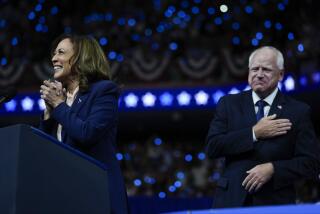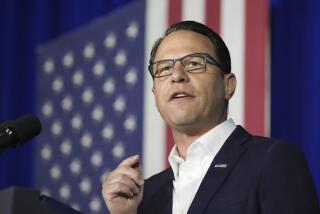‘Favorite sons’ fall out of favor
A final nail has been driven into the coffin of one of the most venerable calculations in American politics by the selection of Delaware Sen. Joe Biden and Alaska Gov. Sarah Palin as running mates, respectively, of Barack Obama and John McCain. The equation in question is that a crucial asset of running mates is that they can carry their home states and thus contribute to assembling the 270 electoral votes needed to claim the presidency. Consider, then, that Delaware and Alaska offer a total of six electoral votes.
If this standard for the selection of the No. 2 person on the ticket enjoyed any validity, especially in what is shaping up as a very close election, then Biden and Palin would have been well down the list.
It is now clear that other factors have trumped the ‘favorite son’ (or daughter) as a criterion in the choice of a running mate, because it is an advantage that either cannot be proved or is just plain wrong. The belief that voters in a state will automatically support a presidential candidate just because one of their own is his running mate is an echo from a period in which local loyalties were much stronger than national ties. In the more primitive media environment of 100 years ago, voters knew little about the personal qualities of the candidates and could be swayed by the appeal of a local boy who made it onto a national ticket.
Yet the belief persisted among political professionals and commentators that voters would dutifully deliver their state’s votes on the basis of local pride, even though recent history and studies in the 1980s indicated that few voters were influenced by state loyalty. But to bolster their case, these experts invariably pointed to the one election in the last half a century in which a running mate did, arguably, carry a state that the ticket would otherwise have lost: vice presidential candidate Lyndon Johnson’s Texas in 1960.
Johnson’s own 44-state sweep when he topped the ticket in 1964 would certainly have included Minnesota even if his running mate, Hubert Humphrey, a Minnesotan, had not been on the ticket. Richard Nixon put Maryland Gov. Spiro Agnew on the ticket and lost Maryland.
Likewise, Walter Mondale’s choice of New York congresswoman Geraldine Ferraro in 1984 did not win him that traditionally Democratic state. But his selection of her did mark a major change in the criteria for selecting a running mate: the hope of carrying a demographic group -- in this case women -- rather than a geographic unit.
Other factors, such as reconciling tensions between wings of the party, figured in decisions such as Jimmy Carter’s choice of Mondale in 1976 as a gesture of reassurance to liberals or Ronald Reagan’s choice of George H.W. Bush in 1980 as a sop to moderates.
But throughout the campaign, we have continually heard arguments being made for potential running mates based on the electoral votes their home states would surely provide. Such talk certainly kept Indiana Sen. Evan Bayh in the running until the Obama campaign concluded that the inclusion of the popular senator and ex-governor would probably not have been enough to overcome Hoosier resistance to Obama, who fared so poorly there against Hillary Clinton in this year’s primary.
And because Biden was born in Scranton, Pa., some commentators insist on seeing a “favorite son” advantage for the Democrats in that important swing state. If Biden does help bring in votes there, it is much more likely to be because of his demographic appeal -- to white, working-class Catholics -- rather than geographic loyalty.
On the Republican side, the most extravagant claims for a potential vice presidential pick delivering a crucial state were made on behalf of Mitt Romney. Here, the winnable state was not Massachusetts, where Romney had been governor and which is irretrievably Democratic, but rather Michigan, where Romney’s father had been a popular governor four decades ago. A case was put forth in favor of Florida Gov. Charlie Crist’s ability to carry his crucial state. Yet McCain ignored both of these arguments in favor of choosing a running mate from a place that no GOP national ticket could possibly lose.
As McCain’s reasons to choose Palin have become clearer, it is safe to say that the hope of winning over disaffected Clinton supporters was subordinate to Palin’s ability to reassure restive social conservatives within Republican ranks. For Obama, the choice of Biden was even clearer, as an offset to his own limited experience in the areas of foreign policy and national security.
So why is it that every four years we are subjected to the tedious and worn-out discussion of running mates in terms of their power to deliver their home states to their ticket? It is a discussion that, in effect, makes the improbable case that local pride induces citizens to support a vice presidential candidate’s party even though they cannot abide the person at the head of the ticket.
Obama and McCain understood in choosing their running mates that Americans are not so attached to their localities as they once were, that in practical terms we are a nation of media markets rather than states, and that the heightened role of partisanship prompts voters to ignore origins in favor of ideology.
More to Read
Get the L.A. Times Politics newsletter
Deeply reported insights into legislation, politics and policy from Sacramento, Washington and beyond. In your inbox three times per week.
You may occasionally receive promotional content from the Los Angeles Times.










